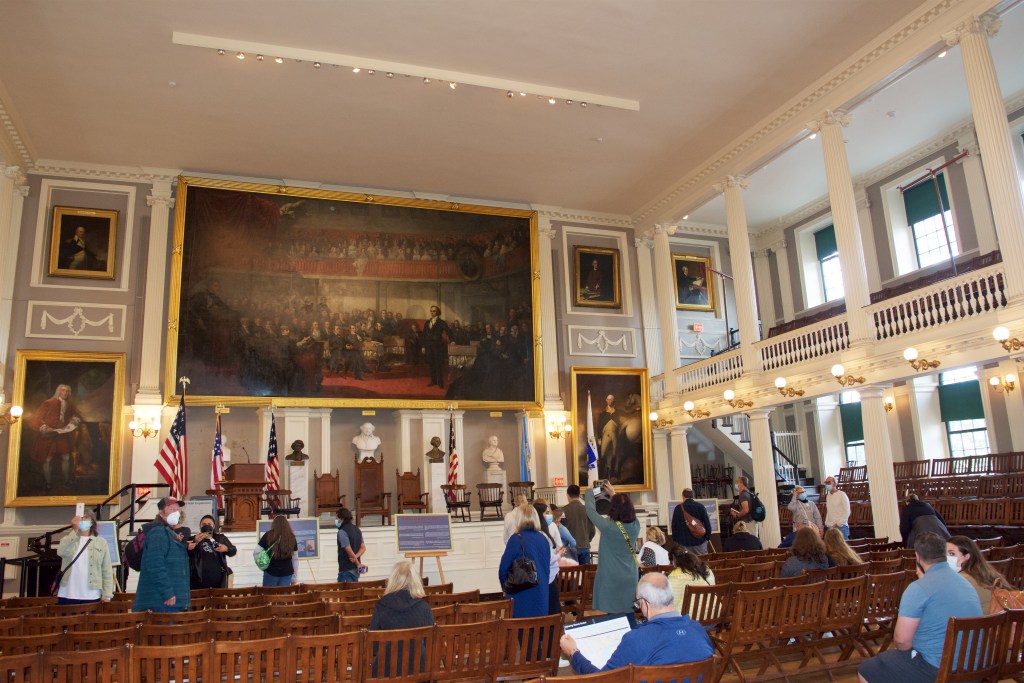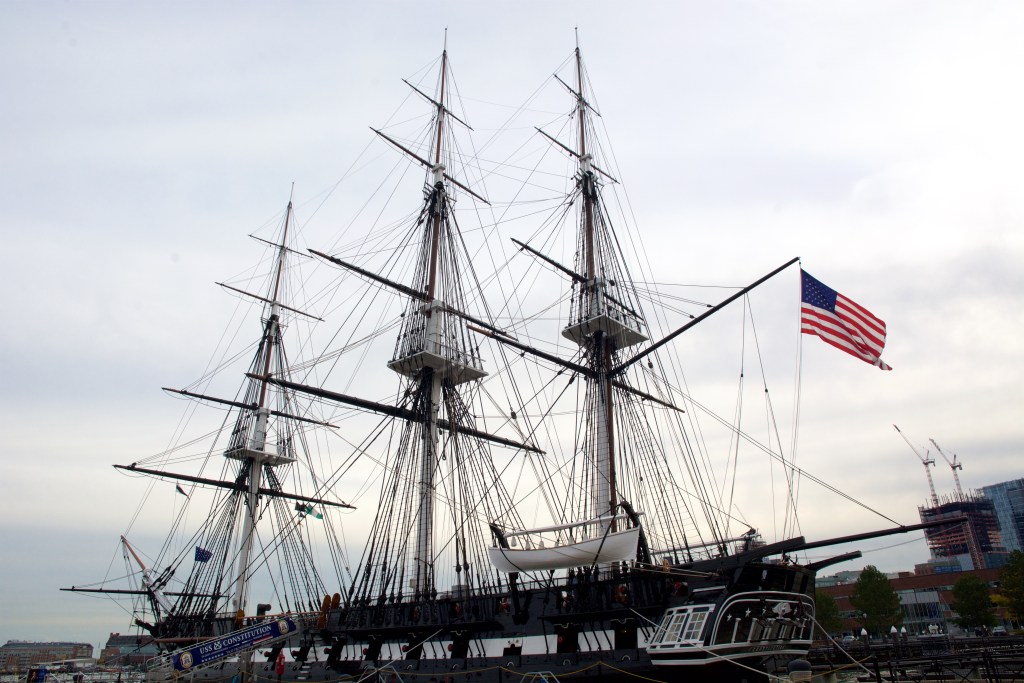This is one in a series about touring Massachusetts and Newport, Rhode Island. My husband and I spent three weeks there in October, 2021. This Travelogue is a journal of our trip, done for my own sake and to show readers why you should visit Massachusetts.
Memorial to the Irish
Continuing down the Freedom Trail (here’s part 1 if you missed it), I eagerly looked for the Old Corner Bookstore where Hawthorne, Emerson, and Longfellow were published. Imagine my disappointment to find that the building was now occupied by a Chipotle restaurant! Oh well, the building served as a nice backdrop to this wonderful memorial to the Irish who fled Ireland during the Great Famine of 1845-1852. One million died of starvation and two million emigrated, 37,000 of them coming to Boston in 1847. They packed in along the waterfront and suffered much discrimination, but rose above it to be integral to American life. I was glad to read that the U.S.S. Jamestown set out from Boston Harbor in late March 1847 to deliver over 800 tons of food and supplies to Cork Harbor, Ireland.


The Old South Meeting House
We saw (didn’t pay to go inside) the Old South Meeting House, built in 1729. Benjamin Franklin was baptized here, and on Dec. 16, 1773, 5000 colonists heard Samuel Adams give the signal to start the Boston Tea Party.

The Site of the Boston Massacre
We also saw the commemorative circle on King’s Street that marks the site of the 1770 Boston Massacre. This is where colonists, angry over British taxes, picked a fight with a lone British soldier who called for reinforcements. The skirmish increased until someone fired a gun, soldiers fired on the crowd, and five colonists were killed. Paul Revere and his fellow Whigs used the incident to their political advantage but made sure to give the soldiers a fair trial. Revere even supplied some of the evidence (Paul Revere’s Ride by David Hackett Fischer, pg 23).


Faneuil Hall
Our next stop was Faneuil Hall. I was afraid it might be boring but I was wrong. Faneuil Hall has been a site for free speech in the US since its beginning–neither one side nor the other dominate. Every president except George W. Bush and Trump have spoken there (why didn’t they??) and I hope the tradition continues.



Some people want to “cancel” the name Faneuil because, though Peter Faneuil built the hall at his own expense in 1742, he was a slave owner and profited off of trading slaves. But I think instead of canceling, its much better to depict the whole history of a place and not try to sweep it under the carpet. The historical society has a sign out for that purpose. I also think it shows the growth of our country to know that African-American abolitionist Frederick Douglass spoke in Faneuil Hall several times.

The Union Oyster House
Before going on to see Paul Revere’s house, we stopped for lunch at the Union Oyster House. Of course it too has quite a history. I found this good little blog that depicts it.



I wish there had been more time to check out the bars. I couldn’t find out how many bars and pubs there are in Boston, but there are A LOT.


Paul Revere’s Home
It is from this house, on April 18, 1775, that Paul Revere set out to warn Samuel Adams and John Hancock that British officers were coming to arrest them.

Unfortunately they don’t allow you to take photos inside, though it was a great tour. I stole a couple off the internet. I especially enjoyed seeing the bedroom. There is a dining table set out in front of the bed. People used to entertain in the bedroom because it was the best room in the house!

This was the original kitchen before Revere upgraded to a more “modern” one:

I also liked this diorama of Revere and crew at work as silversmiths. Sorry for the reflection!

The Old North Church
And here is the Old North Church where two lanterns were hung to show that the British were coming by sea. (If you want the full story of this fateful night, I highly recommend the book Paul Revere’s Ride by David Hackett Fischer)

The U.S.S. Constitution
Our last stop on the Freedom Trail was to see the U.S.S. Constitution and Breed’s Hill. “Old Ironsides” is the oldest commissioned ship in the US Navy. It is a three-masted, wooden-hulled frigate, and the only remaining of the six original warships that comprised the United States’ first navy. She was launched on October 21, 1797.

She got the nickname “Old Ironsides” during the War of 1812. Her crew defeated four British frigates in three separate battles; it seemed as if British cannon could not penetrate her wooden hull. “Huzzah! Her sides are made of iron!”



There is a museum on the grounds as well. It has interesting interactive exhibits for children and adults. And by the way, I’m sorry I’m not including addresses, admission hours, etc for all of these places. It’s better to google it for the most up-to-date information.

Bunker Hill
Last, but not least, is Breed’s Hill where the battle of Bunker Hill was fought. It is up on a hilltop and used to look out over the harbor. Now buildings and trees hide the view.


Because I am feeling lazy at the end of this blog, I will let the writing on this sign explain the historical context of Breed’s Hill. Please join me next time for a blog about Lexington and Concord, and be sure to subscribe if you haven’t already. Thanks!

Discover more from The Footloose Scribbler
Subscribe to get the latest posts sent to your email.




Wow, learned so much. Than you Karen. Great photos and writing,
Larry and Tish
Thank you Larry and Tish!
Very interesting blog about freedom trail in Boston with appropriate photographs. Also a timely reminder of fight for freedom that the left wing politicians are trying take from us at this time
I’m glad you liked it, thanks Jim!